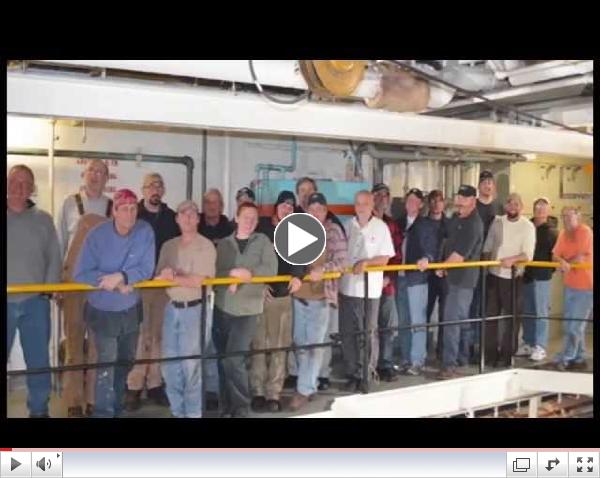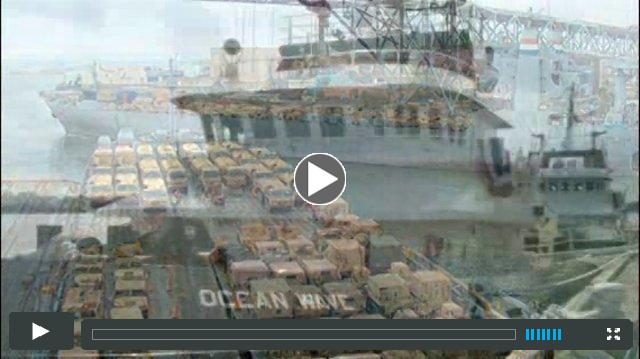|
Prayer Requests:
For the many Filipino Seafarers who are currently at sea, and do not know the status of their families at home, or the status of their homes, due to inability to make contact with them in the aftermath of the Typhoon.
On this Veteran's day, we pray for all the Merchant Mariners who, since 1775 have served our Country during times of Peace and War.
For the Cadets at the Newman Club at New York Maritime Academy , who will be on retreat Nov 15-17.
For the repose of the Soul of Fr. Anthony Hannick, Cruise Ship Priest Member, who passed away recently. Fr. Hannick was from Ireland, and was known for bringing several priests into the AOS-USA Cruise Ship Priest Program to serve the People of the Sea. We thank God for the work of this good Priest.
For the hundreds of refugees and ferry travelers who have died in the last three weeks in maritime disasters in Nigeria and off the Coast of Lampedusa.
For the thousands of Indian Fishing Families impacted by the Typhoon.
For the 19 missing crew members of the M/V Chenglu 15, lost off the South Korea Coast on October 14.
For the continued healing of our AOS USA past vice president, Chris Fogarty, who is now home and undergoing therapy.
|

Join AOS USA Today!
To join AOS USA simply click on the following link:
|
|
Prayers for the Victims of Typhoon Haiyan
We continue to ask for prayers for those affected by Typhoon Haiyan. We particularly pray for those who have perished in this tragedy, their families, and those still waiting for help to rescue them. We also pray for the many seafarers who are currently at sea, who cannot contact their families, and don't know the fate of their families. 
Can you imagine not knowing if your family is ok, though you can see international news casts about the storm on T.V. or on the internet? However, access to individual family members by phone, when phone lines are down, and people are displaced by evacuations, can be a long wait.
On Saturday, we contacted two of our Cruise Ship Priests who live in the Philippines. Fr. Gerome Hernandez reported that they were ok, as they were in Manila, which only received rain and wind. At first report, he stated that everything went pretty well considering the extent of the storm.
However, on Sunday morning, Fr Hernandez gave an important update:
"It seems the initial news was not so accurate at all for those people from the Visayas, particularly in Leyte. The sudden sea surge killed almost a hundred residents staying along the coasts. So far communications are so difficult and people are starting to loot the grocery stores for food. It was a very slow response from the government. According to the news the estimated casualties (dead) might reach to 10,000. Do continue to keep us in your prayers.
God bless,
Fr Gerome, MSP We ask that each of you continue praying for all those affected by Typhoon Haiyan. In order to further assist the people in recovery, please consider donating to the following trusted Catholic organizations special funds:
Knights of Columbus
Catholic Charities: Catholic Charities Typhoon Haiyan Relief Fund May Our Lady Star of the Sea watch over all those affected by Typhoon Haiyan, and guide them to safety,
Doreen M. Badeaux
Secretary General
|
|
Honoring our Merchant Mariners on Veterans Day
Today we honor our US Merchant Mariners with several news items. We hope this information is informative for you, and assists you in helping others to understand the importance of our US Merchant Mariners, as well as merchant mariners from so many other countries.
READ ON!
Senate - bill introduced re WWII merchant mariners
Senator Murphy (D-CT) introduced a bill (S. 1361) to direct the Secretary of Homeland Security to accept additional documentation when considering the application for veteran's status of an individual who performed service as a coastwise merchant seaman during World War II, and for other purposes. Official text of the bill is not yet available.
AOS-USA supports this bill.
Maritime TV Overview of the MEBA (Marine Engineers Benificial Association) | | M.E.B.A. - Pride of the U.S. Merchant Marine |
75th Anniversary Video for the Seafarers' International Union
 | | SIU 75th Anniversary 8minVersion |
Song honoring the Merchant Marine of Great Britain, by Celtae
 | | Merchant Marine |
|
Service Song of the U.S. Merchant Marine and its History
 | Early publicity photo of Jack Lawrence from the 1950s. Photo courtesy of Mr. Lawrence.
|
Courtesy: American Merchant Marine at War: www.usmm.org
The official U.S. Merchant Marine service song was written at the U.S. Maritime Service Training Center, Sheepshead Bay, N.Y., in 1943. The song, "Heave Ho," was written by Lt. j.g. Jack Lawrence, one of the musicians in the base band. Lawrence went on to become one of the great 20th Century songwriters and is known for songs such as "Beyond the Sea" (popularized by Bobby Darin), "Tenderly" and "All Or Nothing At All." Popular entertainers such as Frank Sinatra, Bing Crosby, Ella Fitzgerald, Nat King Cole, and Tony Bennett have all sung his songs.
Lawrence died March 15, 2009, in Danbury, Conn.; he was 96. In November 2007, when the original version of this story appeared in this, then-MSFSC newsletter, Lawrence personally provided the accompanying photo in the course of several email conversations.
Lawrence wrote the U.S. Merchant Marine service song to help tell the story of life at sea during World War II: the merchant marine defying the elements and the actions of the enemy. The song remains part of our country's proud heritage and honors our merchant marine fleet that today still serves proudly.
HEAVE HO! MY LADS! HEAVE HO!
Heave Ho! My Lads! Heave Ho!
VERSE
Give us the oil, give us the gas
Give us the shells, give us the guns.
We'll be the ones to see them thru.
Give us the tanks, give us the planes.
Give us the parts, give us a ship.
Give us a hip hoo-ray!
And we'll be on our way.
CHORUS
Heave Ho! My Lads, Heave Ho!
It's a long, long way to go.
It's a long, long pull with our hatches full,
Braving the wind, braving the sea,
Fighting the treacherous foe;
Heave Ho! My lads, Heave Ho!
Let the sea roll high or low,
We can cross any ocean, sail any river.
Give us the goods and we'll deliver,
Damn the submarine!
We're the men of the Merchant Marine!
SO THAT SHIPS MIGHT GO TO SEA WITH ABLE HANDS
They come-from every point of the compass-from the 48 states -- thousands of them-- of all colors and creeds, to man the ever-growing fleet of Liberty ships that carry the goods to the men of the fighting fronts of this global war.
At the world's largest United States Maritime Service Training Station at Sheepshead Bay, Brooklyn, New York, more than 10,000 are studying the elements of seamanship, are acquiring knowledge about lifeboats and life saving that will protect them along the sea lanes menaced by Axis U-boats, are learning to be clerks, pharmacist's mates, deck hands, engine room hands, ship's cooks or messmen.
At similar shore schools and training ships, thousands more are being trained throughout the nation. At advanced cadet schools, men with previous seaexperience or specialized civilian backgrounds are being prepared for places as officers and radio operators.
Today, these trained men are going out from these schools to win the battle of the seven seas against the submarine, the dive bomber and the surface raider. Upon these men rests the task of passing the ammunition.
To all these men, this song, written by one of their number at the United States Maritime Service Training Station, Sheepshead Bay, Brooklyn, New York, is dedicated.
|
Lawmaker Defends "Essential" Shipping Law
Courtesy: CNBC 30 July 2013
The maritime industry has been a pillar of the economy for as long as shipping vessels have delivered goods and commodities to American shores. In no small part, the Jones Act has been the engine driving this success for nearly a century, requiring that any ship carrying cargo between two ports in the U.S. be American-built, owned and crewed.
Regrettably, not everyone views the Jones Act this way.
For reasons that are due to either a lack of understanding or appreciation for the U.S. maritime industry, the Jones Act is being misidentified once again as an impediment to job creation and even lower product costs.
Joe Petrowski, CEO of Gulf Oil, took the latest shot in what's become a recurring barrage of attacks against the act, suggesting that repealing the law would reduce gasoline prices by as much as 30 cents a gallon.
In other words, using foreign carriers to replace U.S. ships would result in lower gas prices, according to Mr. Petrowski.
(Original story: How can gas prices be slashed? Repeal this act)
That presumption is nothing more than wishful thinking. There are many reasonable and relevant proposals to lower gas prices for American families and secure greater energy independence, but repealing the Jones Act is not one of them.
To refute the claim that the act contributes to higher gas prices, it's necessary to emphasize that the cost for moving a gallon of gasoline on a U.S. ship is less than one penny-per-gallon, on average.
At present, nearly 90 percent of the cost of gasoline is driven by three things: the price of crude oil, refining and taxes. The remaining 10 percent is attributed to marketing, distribution and retailing, leaving room, however big or small, for profit.
Gas prices continue a roller-coaster climb, but will they soon come hurtling down? Gulf Oil CEO Joseph Petrowski thinks so, and predicts $2.30 a gallon by year-end. But as tensions in the Middle East mount, causing oil to soar, Barclays Senior Geopolitical Strategist Helima Croft isn't so sure.
Overall, the maritime cost is marginal and rarely considered a factor in gasoline prices. It is also a general rule that when the price of crude oil increases, as it has recently, so does the price of gasoline.
(Read more: Crude dips as markets await Fed)
The reality is that the Jones Act, despite claims to the contrary, has little to do with price fluctuations at the pump.
Calls for its repeal have long been based on misleading presumptions and incomplete information, much of it originating from industries in direct competition with the U.S. maritime industry.
As if smelling blood in the water, these competing interests perpetually make the case for replacing U.S. workers and vessels with foreign companies and ships to facilitate trade within our borders-an unprecedented dynamic that would put foreign actors in direct control of domestic commerce.
The Jones Act, for all its value in protecting American jobs and sustaining U.S. maritime capability and strength, delivers benefits in other arenas too, including national security.
From supplementing global defense sealift capability to revitalizing elements of a waning industrial base, the U.S. maritime industry is a security and economic asset kept strong and healthy by the Jones Act.
(Read more: JPMorgan pays $410 million to settle energy probe)
America's economic future depends on a strong maritime industry as much as it depends on domestic energy production and the success of other notable industries that are inextricably linked to its success.
As unfortunate as attempts to undermine the U.S. maritime industry may be, there must be no mistaking the relevance and capability of vessels built in American shipyards and operated by American workers.
The Jones Act has been a faithful defender of U.S. maritime capability for more than a century.
No different than the last 100 years, the Jones Act is essential to America's national security and economic future.
-Rep. Duncan Hunter is chairman of the House Subcommittee on Coast Guard and Maritime Transportation.
|
Life at Sea: It's None of My Business"
Courtesy: John Green - AOS Great Britain
The challenges faced by seafarers whilst working on board ships has been highlighted in a short film by Harriet Grecian about the work of seafarer welfare organisation Apostleship of the Sea.
The video offers a candid view of life at sea and how AoS provides pastoral and practical support to seafarers in difficulties.
While ship visiting, AoS Tyne port chaplain, Paul Atkinson speaks to crewmembers about their jobs, which often involves eight-hour days, seven days a week and up to a year at sea.
One of the seafarers describes how he had to continue working despite suffering seasickness in bad weather with waves of up to nine metres high.
"The one thing that keeps us going is the thought of families back home and being able to contact them," says another crewmember.
In another excerpt, Atkinson is seen speaking with four fishermen left stranded ashore in North Shields for months after the vessel they were contracted to work onboard was unable to go out to sea to fish.
The men, from the Philippines, only received three months' wages despite having 12-month contracts, and were not paid for the rest of their contractual period.
"Our families are starving because we've not received our salaries for a long time. We have a very, very big problem," one of them tells Atkinson.
A week after the interview the men were arrested and eventually deported because they were in the UK under a transit visa, which tied them to the specific vessel.
As the ship was unable to go to sea, they were forced to spend time ashore, and thus deemed to be in violation of their visas.
You can watch the full video by visiting our AoS on Film link.
AoS port chaplains and ship visiting visitors help seafarers with practical and pastoral support. Last year AoS supported more than 200,000 seafarers.
 | | Life at Sea: it's none of my business |
|
For the Average Pirate: Piracy Doesn't Pay
Courtesy: Workboat.com
By: Leslie Taylor
November 7, 2013
Piracy is less lucrative than one might think. Despite the $400 million that pirates hauled in between April 2005 and December 2012, the average pirate earns as little as 1 percent of the ransom, according to a new report by the World Bank, Interpol and the United Nation's crime unit.
The report, which includes interviews with more than 30 people involved in piracy off the Horn of Africa, indicates that financiers, not foot soldiers, are the ones who clean up in ship hijackings. Low level pirates receive $30,000 to $75,000 for their participation, which amounts to only 1-to-2.5 percent of the average ransom payment. Meanwhile financiers receive 30 to 75 percent of the total.
The report reveals that ransom money was used to fuel a wide range of criminal activities on a global scale, including arms trafficking, funding militias, migrant smuggling and human trafficking. And of course some was used to further finance piracy activities.
In their efforts to follow the money, researchers found that much of the ransom cash was laundered through the khat trade, particularly in Kenya.
The report offers some practical suggestions to weaken the position of piracy financiers, including strengthening the capacity of countries in the Horn of Africa to deal with illegal cross-border cash smuggling and the development of mechanisms to monitor international financial flows into the khat trade.
To learn more about how piracy evolved from a locally funded operation to a transnational network, or to learn how pirates spend their money (hint: think fancy cars, booze, and women rather than community development projects), check out the report "Pirate Trails."
|
Chouest PSV Attacked off Nigerian Coast
Courtesy: Workboat.com
By: Workboat Staff
October 24, 2013
The U.S.-flagged platform supply vessel C-Retriever was attacked while working off the southern Nigerian coast.
According to gCaptain, the 3,300-DWT PSV's captain and chief engineer, both U.S. citizens, were kidnapped. The vessel, owned by Galliano, La.-based Edison Chouest Offshore, was built at the company's North American Shipbuilding in 1999.
Reuters reported that the 222-foot vessel was attacked early Wednesday and that the State Department and FBI were heading up the U.S. response to the attack.
NBC News said that sources told them that there were no U.S. warships in the region and no immediate plans for a hostage rescue attempt.
"We are closely monitoring reports that two U.S. citizens have been kidnapped from a U.S.-flagged vessel, the C-Retriever, in the Gulf of Guinea," a State Department official said in an email. "We are seeking additional information about the incident."
The attack could have been completely avoided, maritime security company GoAGT Ltd. said.
Nick Davis, CEO of Malta-based GoAGT, said the C-Retriever was navigating a short distance off Brass, Nigeria, on Wednesday when it was attacked in a "recognized high risk area."
"It is imperative that vessels have incredibly competent crews, well trained in radar and visual lookout 24 hours a day in this region, and that there are not multitasking, untrained or fatigued seafarers on the bridge," Davis said in a statement. He added that all vessels trading or supporting operations in this dangerous area should have a citadel and a highly trained and reactive crew.
"This attack resulted in the captain and chief engineer being kidnapped. It was completely and utterly avoidable, and a sad end to a day."
In a separate incident earlier this week, a Joint Task Force (JFT) Nigeria security boat was also allegedly attacked by militants in Nigerian waters, resulting in all JFT personnel being killed and weapons stolen
|
|
|
Important Upcoming Events for
AOS USA Members
World Fisheries Day
November 21, 2013
Houston Maritime Ministry Training School
Feb 9-21, 2014
Houston, TX
http://www.venturecd.net/SeafarersCenter.org/Application.htm
AOS-USA Annual Conference
April 29 - May 2, 2014
Corpus Christi, Texas
National Maritime Day
May 22, 2014
National Day of Remembrance and Prayer for Mariners
May 24, 2014
12:10 pm Mass
Basilica of the National Shrine of the Immaculate Conception
Crypt Church
400 Michigan Ave. N.E.
Washington, DC 20017-1566
|
|
|